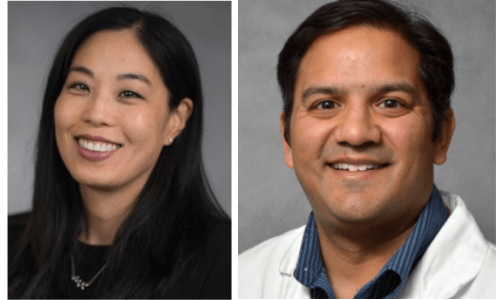March 1, 2022:
Manish Patel, DO and Naomi Fujioka, MD from the Masonic Cancer Center at the University of Minnesota were recently appointed as co-chairs of the Big Ten Cancer Research Consortium’s Head and Neck Clinical Trial Working Group.
Dr. Patel is a physician-scientist researching oncolytic virus for lung cancer. He serves as the associate program director for the hematology, oncology, and transplantation fellowship program and leads the experimental therapeutics phase 1 clinical program at the University of Minnesota. His clinical interests include thoracic oncology, experimental therapies, head and neck cancer, and mesothelioma.
While his initial plan was to study molecular biology, oncology piqued Dr. Patel’s interest during rotations as a medical student at Kirksville College of Osteopathic Medicine and then again as a resident at McGaw Medical Center of Northwestern University-Evanston.
In 2010, when Dr. Patel joined the faculty at the University of Minnesota, he helped fill a need for the patients at the Masonic Cancer Clinic at the University of Minnesota by leading Head and Neck Oncology. Dr. Fujioka joined Dr. Patel on faculty the following year, after finishing her training at the University of Minnesota.
Naomi Fujioka, MD is a medical oncologist specializing in thoracic and head/neck malignancies. Her research is focused on developing food-based chemoprevention against tobacco and environmental carcinogens and collaborating to develop novel biomarkers of carcinogen-induced DNA damage. Dr. Fujioka also acts as a site principal investigator for clinical trials, and is part of the developmental therapeutics clinic team at the University of Minnesota. Dr. Fujioka credits colleagues such as Dr. Patel and Robert Kratzke, MD and mentors such as Stephen Hecht, PhD, for her commitment to her research. interests.
Drs. Patel and Fujioka joined Head and Neck Oncology at the start of an exciting and transformative time when targeted therapies in clinical trials started coming into play. They both saw an exciting future for novel therapies and remain amazed with the progress over the last ten years.
Drs. Patel and Fujioka are eager to expand the work of the Head and Neck Oncology program at the University of Minnesota.
Dr. Fujioka says it is because of the large group of surgeons and radiation oncologists at the University of Minnesota who are dedicated to head and neck cancer, she and Dr. Patel are motivated to spend more time focusing on the department’s head and neck clinical trial portfolio and how to expand it.
“There are a lot of factors that go into why we are looking to expand, but the people around us are amazing and excellent, and we are excited to bring in more head and neck trials to the Big Ten CRC.”
Drs. Patel and Fujioka mention one of the difficulties in head and neck oncology is that it is notably heterogenous, with numerous histologies, some of which end up being orphan diseases where there are minimal clinical trial data to guide optimal treatments. A good example is salivary gland cancers. A goal of the group is to use the resources of the Big Ten CRC on these rarer diseases and more collectively pool their efforts to do trials.
The group has already achieved this goal in practice with the BTCRC-HN17-111 trial. The phase II study for adult patients with advanced salivary gland carcinoma that is androgen receptor positive (AR+), is testing the combination of the PD-1 inhibitor pembrolizumab and androgen deprivation therapy using goserelin.
“BTCRC-HN17-111 is the type of trial that would not be feasible at a single institution, and we identified this as a trial that could go to the Big Ten CRC because we needed the combined forces of the group,” said Dr. Patel.
While the current group is currently small, each meeting is rich with discussion. The co-chairs are eager to hear from investigators who have new ideas in the head and neck space. Drs. Patel and Fujioka are looking to get more diversity of opinion and are encouraging investigators from all member institutions and clinical trial working groups to consider joining the Head and Neck Clinical Trial Working Group.
“We are a group that is very willing to hear new thoughts and ideas and are accepting of different viewpoints,” said Dr. Patel.
If you are interested in joining the Head and Neck Clinical Trial Working Group, find out when the next meeting is by visiting the Big Ten CRC Calendar and join the working group.
About the Big Ten Cancer Research Consortium: The Big Ten Cancer Research Consortium was created in 2013 to transform the conduct of cancer research through collaborative, hypothesis-driven, highly translational oncology trials that leverage the scientific and clinical expertise of Big Ten universities. The goal of the Big Ten Cancer Research Consortium is to create a unique team-research culture to drive science rapidly from ideas to new approaches to cancer treatment. Within this innovative environment, today’s research leaders collaborate with and mentor the research leaders of tomorrow with the unified goal of improving the lives of all patients with cancer.
About the Big Ten Conference: The Big Ten Conference is an association of world-class universities whose member institutions share a common mission of research, graduate, professional and undergraduate teaching and public service. Founded in 1896, the Big Ten has sustained a comprehensive set of shared practices and policies that enforce the priority of academics in the lives of students competing in intercollegiate athletics and emphasize the values of integrity, fairness and competitiveness. The broad-based programs of the 14 Big Ten institutions will provide over $200 million in direct financial support to more than 9,800 students for more than 11,000 participation opportunities on 350 teams in 42 different sports. The Big Ten sponsors 28 official conference sports, 14 for men and 14 for women, including the addition of men’s ice hockey and men’s and women’s lacrosse since 2013. For more information, visit www.bigten.org















Subscribe to the Big Ten CRC Newsletter X
X Facebook
Facebook YouTube
YouTube